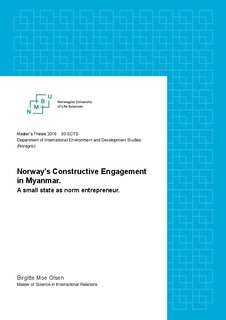| dc.description.abstract | 2011 marked a significant change in Myanmar politics. After nearly 50 years of military rule, a civilian government came to power through multi-party elections and embarked on a series of economic and political reforms. However, members of the democratic opposition saw the transition as nothing more than a façade, as the same generals who had ruled the country in uniforms simply traded them for civilian clothes. It therefore came as a surprise to many that Norway, previously a dedicated supporter of the democratic opposition, became an international frontrunner in engaging with the regime. To understand the tangent taken by Norwegian politicians, critics started accusing Norway of having vested business interests in the national reform process. Many believed that Norway placed too much faith in the reform agenda and contributed to the strengthening of an illegitimate and authoritarian regime.
This study frames Norway’s policy of constructive engagement in Myanmar as norm entrepreneurship. The aim of the thesis is to show how and why Norway assumed this role. I will discuss how constructive engagement became a legitimate option for Norwegian decision makers by looking at discourse. Norwegian politicians aligned its rhetoric within a discourse that challenged the dominant norms on democratic change in Myanmar. By defending alternative strategies, and benchmarking in constructive engagement with the regime, Norway acted as a norm entrepreneur for other Western governments. Norway searched for alternative political solutions in Myanmar, and constructive engagement must therefore be seen as a continuation of the established foreign policy practice of involvement.
Moreover, the case study illuminates how small states are able to exercise influence on the international stage by assuming roles as norm entrepreneurs. Norway used soft power tactics in order to influence the reform agenda in Myanmar, and gather support in the international community. As a small state, Norway has comparative advantages over great powers for assuming the role as norm entrepreneur. Because it is able to fill a role great powers are unable to take, Norway’s norm entrepreneurship is a constant source of status in the international community. Norway’s endeavors in Myanmar must therefore be seen as a continuation over a prevailing trend in Norwegian foreign policy, where Norway uses its moral capital for the sake of status. | nb_NO |

